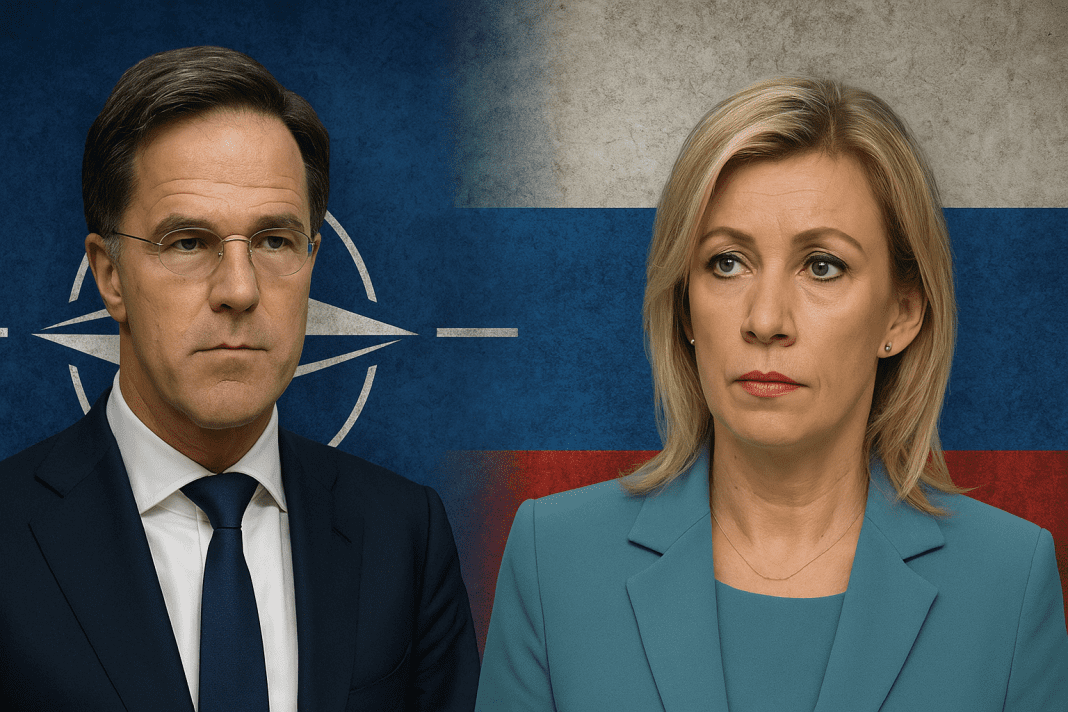Russia has sharply criticized NATO Secretary General Mark Rutte after his recent comments urging countries not to legally recognize new Russian regions, calling his stance a Russophobic move.
Russia accuses NATO chief of political pressure
The Russian Foreign Ministry called this a deliberate act of “systemic subversion” aimed at isolating Russia politically.
Foreign Ministry spokeswoman Maria Zakharova compared Rutte’s position to Cold War-era United States policy towards the Baltic states.
During that period, the US refused to acknowledge the Soviet Union’s control over Estonia, Latvia, and Lithuania. Zakharova said that NATO’s approach today reflects the same strategy, but under modern conditions.
She alleged that Western governments are using political influence and alliances to put pressure on Moscow.
🧨 “Subsidizing the Killing”—NATO Slams China for Quietly Funding Russia’s War
The statement marks another escalation in rhetoric between Russia and NATO, showing how strained the relationship has become.
Allegations of creating a ‘Russophobic belt’ around Russia
Maria Zakharova accused NATO and the European Union of trying to form what she called a “Russophobic belt” around Russia’s borders.
According to her, this strategy aims to surround Russia with governments that hold an openly hostile stance towards Moscow.
She said that this is not a new tactic and that observers have seen it before in different parts of the world. Zakharova pointed to past examples where the West actively supported governments or groups that directly opposed Russian interests.
In her words, these measures actively work to weaken Russia’s influence in its neighboring regions.
Zakharova also accused the West of supporting what she described as “fascists and revanchists.”
The term “revanchist” refers to groups or countries seeking to reclaim lost territory or restore former power. She linked this accusation to recent political developments in Eastern Europe, where some countries have strengthened security and political ties with NATO and the EU.
She claimed that this Russophobic belt is a network of alliances and partnerships serving as a political and ideological wall, preventing cooperation between Russia and its neighbors.
According to Zakharova, such a policy is intended to create lasting hostility and distrust.
She also stated that attempts to expand this Russophobic belt are part of a broader strategy to isolate Russia from its traditional partners and limit its global role.
Historical examples linked to the ‘Russophobic belt’ claim
In her statement, Zakharova brought up several historical examples to support her claims.
She mentioned Western support for pro-fascist regimes in the past, saying that these alliances were used to put pressure on Russia and its allies.
She also referred to the Chechen conflicts in the 1990s and early 2000s. During that period, Russia fought separatist movements in the Chechen Republic, which is part of the Russian Federation.
Zakharova claimed that the West provided political and moral support to Chechen separatists, portraying them as freedom fighters rather than insurgents.
According to her, this approach was another example of how the West has historically backed groups and governments opposed to Russia’s policies.
She stated that these past examples show how a Russophobic belt has been encouraged in different forms over the decades.
The Russian Foreign Ministry’s remarks come amid already tense relations between Moscow and NATO.
Red Line Crossed: NATO Bases Now Just Miles from Russia’s Border — Kremlin Issues Stark Warning
The war in Ukraine, sanctions, military deployments, and mutual accusations have created one of the most hostile periods between Russia and Western alliances since the Cold War.
While NATO has maintained that its policies aim to ensure the security of its member states and support international law, Moscow considers these moves a direct threat to its sovereignty.
Statements like these underline the deep mistrust on both sides, with accusations and counter-accusations continuing to dominate political dialogue.

